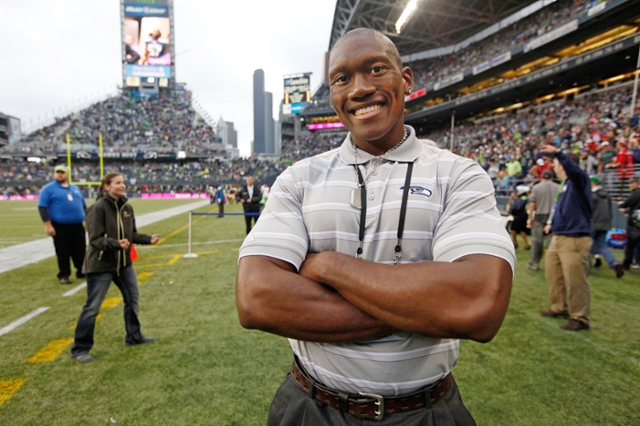Page 209 • (2,185 results in 0.018 seconds)
-
program from August 2007 to February 2014. Teska was dedicated to teaching, scientific research, and sustainable development and conservation. He developed research programs in Central America and the Galapagos Islands in the 1980s at Furman University in Greenville, South Carolina, where he chaired the Latin American studies concentration, implemented an interdisciplinary program among five departments and supervised dozens of undergraduate research projects. In addition to his work with the U.S
-

, Pacific Lutheran University seniors Hailey Olafson and James Van Alstine presented their mathematics research at the Joint Mathematics Meetings in San Antonio, Texas. JMM, put on by the Mathematical Association of America and the American Mathematical Society, is the largest mathematics meeting in the world. The research Olafson and Van Alstine presented, on changing the base of numbers, was conducted over the summer with PLU Assistant Professor of Mathematics Tom Edgar. Edgar says that numbers we
-

Assault , the CDC and the American Public Health Association, in collaboration with the departments of Education and Justice, convened the Think Tank in Atlanta from May 5-6 to inform the development of guidance for a comprehensive approach to sexual-violence prevention on college campuses. In July, CDC and APHA will host a meeting for CDC’s Rape Prevention and Education (RPE) grantees to put the Think Tank’s guidance—including Warwick’s considerable input—into action. “I am excited to share some of
-
Obituaries Submit a Class Note Calendar Calendar Highlights ResoLute Staff Marketing and Communications Kari Plog ’11, senior editor Kari returned to PLU in January 2016. She previously spent five years working in nearly every corner of the newsroom at The News Tribune in Tacoma. Her experience spanned from sports and news copy editing and pagination to local government, communities and breaking news reporting. In addition, Kari’s investigative stories earned her multiple awards, including New Journalist
-
Calendar Calendar Highlights ResoLute Staff Marketing and Communications Kari Plog ’11, senior editor Kari returned to PLU in January 2016. She previously spent five years working in nearly every corner of the newsroom at The News Tribune in Tacoma. Her experience spanned from sports and news copy editing and pagination to local government, communities and breaking news reporting. In addition, Kari’s investigative stories earned her multiple awards, including New Journalist of the Year in June 2015
-

addition to the pre-law advising program, you can also minor in pre-law. This minor has a set curriculum that helps you develop the skills that the American Bar Association recommends for prospective law students. Graduates from the last 5 years: Their Law Schools Arizona State University’s Sandra Day O’Connor College of Law Howard University Gonzaga University University of Washington Seattle University University of Minnesota Denver Sturm College of Law University of Maryland University of Michigan
-
by contacting the scholarship and enrollment officer. Note: A maximum of 20 semester hours earned in ROTC programs may be applied toward a baccalaureate degree at PLU. Advance course students must take or have taken a professional military education history course that includes one of the following: HGST 200: Introduction to Holocaust and Genocide Studies HIST 329: Europe and the World Wars, 1914-1945 HIST 349: U.S. Civil War and Reconstruction HIST 352: The American Revolution IHON 257: The
-
with force. Mural created by Central American migrant refugees living in Casa Tochan, Mexico City. Photo Credit: Adela Ramos. We returned to Oaxaca, where I continued part of my studies through an Anthropology class focused on indigenous populations in Oaxaca. With the knowledge I gained through our experiences, and especially our time visiting with IMUMI, I was able to relate what we learned to what I was and am currently studying. For example, an important aspect of the migration of indigenous
-

York City: ✓ Attend a Super Bowl: ✓ Work for an NFL team: ✓ Finish college and work in his major: ✓ Barnes graduated from PLU with a degree in business—and uses that degree every workday as an intern for the Super Bowl-worthy Seattle Seahawks. All these dreams once seemed so out of reach for Barnes, the first of his family to graduate from college. Growing up in Redmond, where he was the only African-American child in his elementary school, Barnes recalls being bullied and taunted. Of course, the
-
does it all with great humility. He performs extremely difficult music at the highest level. Max has been a regular cellist and mandolin player in the Jazz Ensemble and The Choir of the West premiered one of his choral pieces at their Spring concert. Max embodies all that our students strive to be. He was recently a standout performer in the North American premiere of Sandstrøm’s St. Matthew Passion, where he was a leader in the Evangelist quartet. Our faculty witnessed Max’s sharp attention to
Do you have any feedback for us? If so, feel free to use our Feedback Form.


